Our exploratory team was tasked with investigating possibilities for a future MPT team in Juárez, Mexico and submitting our findings in writing to the MPT Juárez Committee. This committee will use our report to make recommendations to MPT’s Core Community regarding any future work in Juárez.
Now we have completed our exploratory work. It has been a great privilege for us to be with the people of Juárez these past weeks and to work in the name of Michigan Peace Team.
Please know that we are grateful beyond words for your support, good energy, and prayer during our stay in Juárez.
Your MPT Juárez Exploratory Team to Juárez,
Berta Betanzos
José López
Renee Richie
Liz Walters
Saturday, November 21, 2009
November 18, 2009
 During the morning we met with members of the Center for Human Rights in Juárez. This is the group that invited MPT to send an exploratory team to Juárez. At this meeting our team reported the highlights of our findings and expressed our gratitude to the Center members for their excellent work. Center members then shared final messages with us.
During the morning we met with members of the Center for Human Rights in Juárez. This is the group that invited MPT to send an exploratory team to Juárez. At this meeting our team reported the highlights of our findings and expressed our gratitude to the Center members for their excellent work. Center members then shared final messages with us.Here is a summary of the responses from Center members after our team report:
· The children … they are our heart …we needed more time so that you could see how the children play, how they learn, how they live AND how we love them. I want you to see that the children of Juárez are the light of our hearts.
· We start with the children. They are our future AND our present.
· Thank you for your presence. You have motivated me and helped me to learn how to be part of a team. To solve our problems we have to be serious about teamwork. Peace is for everyone. Seeing how MPT works gives me hope. We can do much more here.
· Thank you -- what you have done. You have been with people who have been in fear and terror. The proposals that you have shared are very positive. Also you help us to see how to unite together with other organizations. Our people are paralyzed with fear. The organizations are also paralyzed. The situation has been very difficult -- you have helped us to lift our spirits. We need so much. We are dealing with those who have much power and no respect for life.
· You have experience with groups of people. This has been good. You have explored our roots and the history of our people. The presence and accompaniment --- I feel that it is very powerful for the people. I like that you have opened up to see how people live, and how they you want to be with you.
· We have much work to do here to resolve our problems. As you return to the United States I hope you will share how things need to change there too: Some of the problems we face in Juarez are rooted in the United States. For example…The maquiladoras exploit our people and harm our family structure. Also the drug trade flows to the United States and weapons flow from the United States to Juárez.
· Now very young youth collect $100 for killing a person—it’s awful to say but this has become a business. Hit men are 14 or 16 years old. This is what I fear in the Barrios – Juárez children are being used for this terrible business. After killing they sit down and wait for the soldiers. They know they will not get jail time
· You help us to see the importance of listening. We need to listen to one another.
· Our people of Km 27 very happy that you have come. We are very disposed to receive MPT.
· The people of the First of May say they noticed us. They see we want peace and have many needs. You are very welcome --We hope that you can return!
· I would say to you thank you for you solidarity—You see clearly that not only is Juárez filled with violence; but it is also filled with hope.
· I was quite concerned about Juárez and the country---Until Julia said that peace was possible -- the obstacles are great. Authoritarianism is strong and things will get worse. I want to be hopeful and work hard for Juárez.
· It would be wonderful to have you in the whole city. It would be a great support. Thanks to Julia and all of you for coming.
Following this meeting we were invited to a celebration sponsored by a group of senior citizens in Juárez.
With them we enjoyed a delicious meal and we danced together. Wisely the seniors told us, singing and dancing is part of our work!

Finally we had an important meeting with two Adrian Dominican sisters (Donna and Maureen) who have dedicated their lives in service of the people of Juárez. Their love wisdom and insights touched us deeply.
Friday, November 20, 2009
November 17, 2009
http://www.casapj.org/index.php
This center involves young people from poor neighborhoods in productive and constructive alternatives. They work from the premise that gangs are excellent vehicles for poor youngsters to socialize. The center redirects and refocus such activities as graffiti painting and hip hop/rap into a form of artistic expression for young gang members. The center coordinated the summit of several neighborhood gangs (Ratas 13, Los Tristes. Bajos 21, Novenos, and others) and in one day of collaboration among the different gangs painted a mural along the wall of a day care center affiliated with the center. Each gang used its colors and tried to express their own voice.
One of the youngsters sharing his experiences at
the center with us is a
http://www.youtube.com/watch?v=wt8HiGhszxk&feature=player_embedded#
The center is in the midst of a girls soccer competition. Young women from different neighborhoods form soccer team and compete against each other. The matches are well attended and provides a gathering place where gangs and people from all the surrounding neighborhoods can intermingle in a social and pacific way. They even have a team made up entirely of Tarahumara young women.
Additionally the center provides educational opportunities for young people whose parents cannot afford the uniforms or textbook required by the public education system. The center is in process of expansion into a building donated by its former user Kolping International.
Tuesday, November 17, 2009
November 15, 2009
Misa, 11:30 am, Sta Elena
Following the Mass 55 people, both young and old, stayed to share their stories of the recent situation in Juárez. Violence - fear - paralyzed - need to pray - were what we heard.
Violence - fear - paralyzed - need to pray - were what we heard.
Following the Mass 55 people, both young and old, stayed to share their stories of the recent situation in Juárez.
 Violence - fear - paralyzed - need to pray - were what we heard.
Violence - fear - paralyzed - need to pray - were what we heard.Pancho challenged them to be active, keep hope even if they might be killed for their dreams.
Two youths spoke of personal experiences of violence. Several women also shared experiences with tears in their eyes. One 12-year old youth shared how he was affected by what happened when he was detained by the military. A university professor repeated what Lorenzo said about individual leadership needed, and urged them to hold on to their dreams. A different youth said laws are lenient for minors. Courts give limited sentences and they return to society even more violent than before. Another youth told us that two young hit men from two different gangs were at a social event. They were asked, “How can you be social with an opposing gang member? One replied in an indifferent manner, “It’s not a problem. Here I can socialize and the other is my job. The same person added that young people fail to recognize killing causes extreme grief, that impacts the family permanently, suddenly there is no inco me just loss of a loved one. One mother noted that Forbes Magazine lists Mexicans Joaquín "El Chapo" Guzmán (leader of the Sinaloa drug cartel) and Carlos Slim among the richest people in the world. Her concern is that young people look to them as models. Pancho said that youth need to be respected and encouraged to get an education where they will learn good moral values.
me just loss of a loved one. One mother noted that Forbes Magazine lists Mexicans Joaquín "El Chapo" Guzmán (leader of the Sinaloa drug cartel) and Carlos Slim among the richest people in the world. Her concern is that young people look to them as models. Pancho said that youth need to be respected and encouraged to get an education where they will learn good moral values.
And so we have come to realize the situation here is very complex, yet leaders are being called forth to lead organizations to change the violent atmosphere. We were especially challenged by one man to pray for our enemies, the drug lords, the corrupt government, the military and the police. We left feeling that in spite of all the difficulties, suffering, the people have maintained hope.
Two youths spoke of personal experiences of violence. Several women also shared experiences with tears in their eyes. One 12-year old youth shared how he was affected by what happened when he was detained by the military. A university professor repeated what Lorenzo said about individual leadership needed, and urged them to hold on to their dreams. A different youth said laws are lenient for minors. Courts give limited sentences and they return to society even more violent than before. Another youth told us that two young hit men from two different gangs were at a social event. They were asked, “How can you be social with an opposing gang member? One replied in an indifferent manner, “It’s not a problem. Here I can socialize and the other is my job. The same person added that young people fail to recognize killing causes extreme grief, that impacts the family permanently, suddenly there is no inco
 me just loss of a loved one. One mother noted that Forbes Magazine lists Mexicans Joaquín "El Chapo" Guzmán (leader of the Sinaloa drug cartel) and Carlos Slim among the richest people in the world. Her concern is that young people look to them as models. Pancho said that youth need to be respected and encouraged to get an education where they will learn good moral values.
me just loss of a loved one. One mother noted that Forbes Magazine lists Mexicans Joaquín "El Chapo" Guzmán (leader of the Sinaloa drug cartel) and Carlos Slim among the richest people in the world. Her concern is that young people look to them as models. Pancho said that youth need to be respected and encouraged to get an education where they will learn good moral values.And so we have come to realize the situation here is very complex, yet leaders are being called forth to lead organizations to change the violent atmosphere. We were especially challenged by one man to pray for our enemies, the drug lords, the corrupt government, the military and the police. We left feeling that in spite of all the difficulties, suffering, the people have maintained hope.
November 14, 2009
Saturday was a day to rest. We did have the opportunity to visit Granjas Unidas a colonia high 
 up in the hills of small animal breeders. There we experienced the dances of a group of Matachines. Usually
up in the hills of small animal breeders. There we experienced the dances of a group of Matachines. Usually  one group sponsors another by providing the new group with the dance costumes. This ceremony included the blessing of the new garments and banners. Matachines are group of dancers who perform religious themed dances usually at several Roman Catholic celebrations.
one group sponsors another by providing the new group with the dance costumes. This ceremony included the blessing of the new garments and banners. Matachines are group of dancers who perform religious themed dances usually at several Roman Catholic celebrations.

 up in the hills of small animal breeders. There we experienced the dances of a group of Matachines. Usually
up in the hills of small animal breeders. There we experienced the dances of a group of Matachines. Usually  one group sponsors another by providing the new group with the dance costumes. This ceremony included the blessing of the new garments and banners. Matachines are group of dancers who perform religious themed dances usually at several Roman Catholic celebrations.
one group sponsors another by providing the new group with the dance costumes. This ceremony included the blessing of the new garments and banners. Matachines are group of dancers who perform religious themed dances usually at several Roman Catholic celebrations.
November 16, 2009
Land ownership was the topic of this day’s meeting with the lawyer who represents people who have been living on the land and working to obtain legal title to their property for the past thirty years or more. The president of the ejido and a person who brought a group of peasants to the ejido forty years ago were present. The lawyer gave a brief history of the manner in which Mexican department of Agrarian Reform distributed land. Government land that was not being used was given to peasants who had little or no income with the requirement that the land must be used for farming and or raising animals. Large parcels of land called ejidos were often located in the outskirts of municipalities and the peasants had to petition the department of Agrarian Reform to legalize their status as landowners. In recent years, some Juárez peasants learned that their ejido remained at the petition status and not yet legalized. In addition, due to government corruption, wealthy people were allowed to purchase ejido land already occupied by peasants. In some cases, homes were torn down, fences were erected, and farm animals were taken by the wealthy. Some peasants were made to pay for the same property more than once or pay dues to occupy their land.
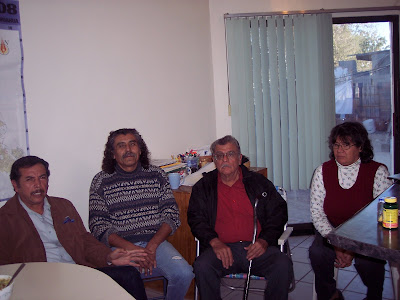 In 1994, a former president of México, enacted a law to end Agrarian Reform to allow wealthy individuals to use their money to develop unused lands. It was stated that there is a large multinational plan to develop an economic corridor from New México to Panama. In one case, a in wealthy individual got the title to land ownership in 48 hours contrasted to the 30 years peasants have struggled to obtain a legal title to their land.
In 1994, a former president of México, enacted a law to end Agrarian Reform to allow wealthy individuals to use their money to develop unused lands. It was stated that there is a large multinational plan to develop an economic corridor from New México to Panama. In one case, a in wealthy individual got the title to land ownership in 48 hours contrasted to the 30 years peasants have struggled to obtain a legal title to their land.

 In 1994, a former president of México, enacted a law to end Agrarian Reform to allow wealthy individuals to use their money to develop unused lands. It was stated that there is a large multinational plan to develop an economic corridor from New México to Panama. In one case, a in wealthy individual got the title to land ownership in 48 hours contrasted to the 30 years peasants have struggled to obtain a legal title to their land.
In 1994, a former president of México, enacted a law to end Agrarian Reform to allow wealthy individuals to use their money to develop unused lands. It was stated that there is a large multinational plan to develop an economic corridor from New México to Panama. In one case, a in wealthy individual got the title to land ownership in 48 hours contrasted to the 30 years peasants have struggled to obtain a legal title to their land.The people living in the ejidos lack running water, paved streets and other services because the municipality requires land titles to deliver these services. The presenters stated that large amounts of money have been spent to construct roads and provide water along the future economic corridor where there are no people living.

The lawyer stated that these people must have hope, perseverance, a vision. He added that the ejido has leaders, yet needs organizers, more involved residents of the ejido, and funds to complete the legal process. This presenter affirmed that the presence of women religious and some clergy gives the people hope because they work so that people know their rights.
Saturday, November 14, 2009
November 13, 2009
 Today our team met with three organizers of a network of ten women’s groups in Juárez and México. During their analysis they reported that violence and violent responses are moving the Juárez community and indeed the whole of México in the opposite direction of liberation and justice. They also reported that the media plays a key role in promoting this negative direction. For example, in Juárez fear is widespread and it's impact is negative. Fear imprisons families in their homes. It scares people into silence. It prevents people from helping victims of violence or their families. It paralyzes the human spirit. Moreover, to the support the militarization of Juarez, the government is diverting human service funds to the military.
Today our team met with three organizers of a network of ten women’s groups in Juárez and México. During their analysis they reported that violence and violent responses are moving the Juárez community and indeed the whole of México in the opposite direction of liberation and justice. They also reported that the media plays a key role in promoting this negative direction. For example, in Juárez fear is widespread and it's impact is negative. Fear imprisons families in their homes. It scares people into silence. It prevents people from helping victims of violence or their families. It paralyzes the human spirit. Moreover, to the support the militarization of Juarez, the government is diverting human service funds to the military.In contrast, the orga
 nizers of the network share a message of vision and hope. The women’s network is pioneering a new direction and the formation of a new movement. They have three clear and immediate goals: one, to publicly promote human rights, justice, and peace; two, to advocate legislative action; three, to reach out locally, nationally, and internationally. Locally they sponsor theater-in-the-streets to help the people understand what is happening and they make public violence and injustice and talk about human rights in the streets. Nationally they organize public events and marches. Presently one march that includes women from twelve states is headed for Mexico City. Internationally they reach out to human rights groups around the planet. Moreover they are beginning to use the tools of the internet.
nizers of the network share a message of vision and hope. The women’s network is pioneering a new direction and the formation of a new movement. They have three clear and immediate goals: one, to publicly promote human rights, justice, and peace; two, to advocate legislative action; three, to reach out locally, nationally, and internationally. Locally they sponsor theater-in-the-streets to help the people understand what is happening and they make public violence and injustice and talk about human rights in the streets. Nationally they organize public events and marches. Presently one march that includes women from twelve states is headed for Mexico City. Internationally they reach out to human rights groups around the planet. Moreover they are beginning to use the tools of the internet.Organizers tell us that they experience dangers, and intimidation and sometimes feel alone. Community and solidarity is their source of strength and the possibility of peace team presence and nonviolent protective accompaniment speaks to them.
In the evening we met with representatives from four colonias, (neighborhoods). The meeting began with a positive reflection on team work. Then the representatives shared information about their needs assessments and organizing efforts.
Friday, November 13, 2009
November 12, 2009
We visited Casa del Migrante en Juárez, A.C. It was founded in June 1990 by the Scalabrinians priests as a shelter and place for rest for migrants on their way to the USA. In recent years its mission has change to accept the people who are deported from the USA back to México each day. Visit
www.casadelmigrante.com
It is now being run by 1 priest, 1brother, and 4 nuns all from Dominican congregations. Their objective is to treat these poor, rejected people in the most humane way possible. They go to the San
The Casa welcomes them, feeds them, and offers them a shower, a bed with clean sheets. They have a large section where they have donated clothes to make the returning people feel like human beings again. There is a chapel that is available as they begin to recover so they can continue their journey home. Bus companies provide up to 50% discounts on their tickets back to where they came from but they must find the other part of the fare themselves. People from Tijuana are returned to Juárez and those from Juárez are returned to Tijuana.
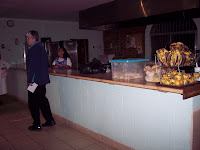
Returning people stay overnight up three days and there are exceptions especially for women who have been separated from their children. Most of those returning find their way back home but they have been so traumatized reentry is extremely difficult. The unemployment and economic crisis in México makes their lives chaotic. Resources for therapy and health is almost non existent.
The USA dumps people over the border it is a “Mexican Problem.” Meanwhile US trade policies, use of drugs, sale of arms has changed the culture of our Mexican brothers and sisters. The roots of poverty need to me explained more clearly in the US if we are really serious about building a peaceful inter-relational world.
Today, as we heard Rubén García said, one work of the MPT could be to develop language to speak to the US culture about the dynamics what is happening in Juárez. Rubén is the director of Annunciation house and invites people of the US to come for an immersion experience to analyze the reality of Mexican-US border. 

Today we also met West Cosgrove, director of Casa Puente, who believes strongly that one of the causes of border injustice has its roots in the US immigration policies. West is working with immersion groups, giving lectures, and doing whatever he can to help people in the US to understand the crisis that has been created in Juárez and is growing bigger each day. No matter what wall we build or what arms we use, the answer to stopping violence comes with creating a better world for everyone on both sides of the border. Both Annunciation House and Casa Puente are located in El Paso, Texas. For reference check out www.projectpuente.org
November 11, 2009
 The team called today’s site “An oasis in the middle of a desert.” Our site visit in the morning took place at a private school and cooperative built on the top of the former garbage dump of the city. Centro Santa Catalina de Siena serves 30 kindergartners in three shifts of 10 each according to age, and300 students for after school programs. Students come from the nearby colonias. The students receive a full scholarship.
The team called today’s site “An oasis in the middle of a desert.” Our site visit in the morning took place at a private school and cooperative built on the top of the former garbage dump of the city. Centro Santa Catalina de Siena serves 30 kindergartners in three shifts of 10 each according to age, and300 students for after school programs. Students come from the nearby colonias. The students receive a full scholarship.The Centro also hosts a women’s cooperative where 29 ladies work three mornings per week creating indigenous style tablecloths, shawls, handbags, and other made-to-orde
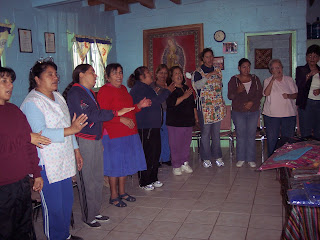 r garments for sale at churches in the USA and through the internet. These women receive a monthly salary and participate in the decision making process of the cooperative/school. Most of these women came to Juarez about 20 years ago from México’s interior searching for jobs to support their families.
r garments for sale at churches in the USA and through the internet. These women receive a monthly salary and participate in the decision making process of the cooperative/school. Most of these women came to Juarez about 20 years ago from México’s interior searching for jobs to support their families.After sharing their stories of violence in Juárez, one of the women said, “Centro Santa Catalina is one of the solutions. It teaches children their ABCs and family values. Women can come to create beautiful crafts and sell them. Women now are aware that they have rights and they do not have to suffer domestic violence and other human rights injustices.”
The latest project the Centro undertook is the creation of three raised vege
 table gardens. The hope is to expand it as a community garden project in order to unite the communities.
table gardens. The hope is to expand it as a community garden project in order to unite the communities.Centro Santa Catalina is incorporated as a 501(c)3 in the USA and is able to fulfill its mission with the generous donations and contributions of many foundations, corporations, and individuals.
In the afternoon we visited the Integral Defense Area of the Human Rights Center. They made a presentation on their history and objectives followed by statistics of their service to the community. This group is deeply involved with the land ownership issues of the Colonia Km 27 that we visited last Sunday. The Integral Defense Area is discerning over the dissolution of the Agrarian Reform office, the installation of an Ejido 30+ years ago, the lack of legal papers showing ownership of the land, and the fast moving mega development (Geronimo Project) of the area for an industrial park that will cover lands in New Mexico, Texas, and Juárez, México. This Human Rights Center invited the MPT to place a permanent team in Juárez and has been achieving its goals with a series of successful programs in favor of the poor in Juárez.
November 10, 2009
The analyst pointed out that the majority of those convicted of crimes in Juárez are of low socio-economic class and there is manipulation of information transmitted to the population. People are paralyzed with fear, lack trust of police entities at all levels of government. He also stated that when social problems are not acknowledged they cannot be resolved.
This speaker affirmed that grassroots people need to be empowered to make social changes. They must have hope and dreams, as well as, leadership and solidarity with others.
Thursday, November 12, 2009
Tuesday, November 10, 2009
November 9, 2009

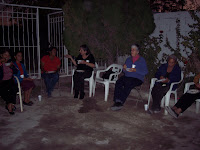
We met at the house of one of the community organizers in Colonia Primero de Mayo. Twenty two women gathered to share their experiences with violence and brought a dish to pass. According to them, this neighborhood has experienced the assassination of three of its young people. It has experienced the random patrol of army soldiers with some home invasions and robberies. Residents in this neighborhood deal with random shootings, assaults among neighbors, the violation of their rights because they are not aware of their rights, and the fear of leaving their homes at night. Several of the women expressed their personal stories of divorces or plain abandonment by their mates, being prey of scam artists, and becoming disabled and unable to provide for their families.

At the same time we observed several positive things in the neighborhood. First, children were happily playing on the dirt streets in the late afternoon/dusk. Second, a group from the USA has recently come to this neighborhood and built two-rooms houses for needy families under the program “Casas por Cristo” or Homes because of Christ. Third, the people in the community are starting to organize and learn about their human rights and the importance of presenting a united front. They show a hope for better times soon.
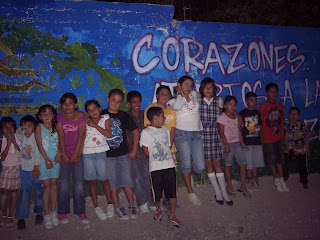 Lastly, we visited in the same neighborhood a session of the program “Pasito a Pasito” or Little step after Little Step. There adult coordinators from the Center of Human Rights provide well-structured activities for young children two days per week. The activities include creative singing while acting out the words, mural painting to cover and decrease graffiti, and other team building activities to instill a sense of trust and other civic values on the leaders of tomorrow.
Lastly, we visited in the same neighborhood a session of the program “Pasito a Pasito” or Little step after Little Step. There adult coordinators from the Center of Human Rights provide well-structured activities for young children two days per week. The activities include creative singing while acting out the words, mural painting to cover and decrease graffiti, and other team building activities to instill a sense of trust and other civic values on the leaders of tomorrow.

At the same time we observed several positive things in the neighborhood. First, children were happily playing on the dirt streets in the late afternoon/dusk. Second, a group from the USA has recently come to this neighborhood and built two-rooms houses for needy families under the program “Casas por Cristo” or Homes because of Christ. Third, the people in the community are starting to organize and learn about their human rights and the importance of presenting a united front. They show a hope for better times soon.
 Lastly, we visited in the same neighborhood a session of the program “Pasito a Pasito” or Little step after Little Step. There adult coordinators from the Center of Human Rights provide well-structured activities for young children two days per week. The activities include creative singing while acting out the words, mural painting to cover and decrease graffiti, and other team building activities to instill a sense of trust and other civic values on the leaders of tomorrow.
Lastly, we visited in the same neighborhood a session of the program “Pasito a Pasito” or Little step after Little Step. There adult coordinators from the Center of Human Rights provide well-structured activities for young children two days per week. The activities include creative singing while acting out the words, mural painting to cover and decrease graffiti, and other team building activities to instill a sense of trust and other civic values on the leaders of tomorrow.November 8, 2009
 Colonia Km. 27 is in the outskirts of Juárez. It is a neighborhood without running water or street lights. Its inhabitants are going through tough times dealing with land ownership issues. Some have papers from the time of the Agrarian Reform but need legal assistance in clarifying their ownership status. Many of the long time settlers are afraid because during the past five years other residents have had their homes torn down or burned down by the supposedly new owners of the land. They reported that the new owners are usually rich and influential business people willing to expand their empires at any cost without proper compensation.
Colonia Km. 27 is in the outskirts of Juárez. It is a neighborhood without running water or street lights. Its inhabitants are going through tough times dealing with land ownership issues. Some have papers from the time of the Agrarian Reform but need legal assistance in clarifying their ownership status. Many of the long time settlers are afraid because during the past five years other residents have had their homes torn down or burned down by the supposedly new owners of the land. They reported that the new owners are usually rich and influential business people willing to expand their empires at any cost without proper compensation.The local residents were very candid in sharing their experiences with us. Another i
 njustice experienced by one of the participants and common to many other residents is that of falling prey to loan sharks. Although three of the residents settled out of court and were able to get out of the unreasonable high rate of interest and late fees (some as high as 800%), others are afraid to come forward because of threats made by the lender and her family. The lender is also a resident in the same neighborhood who is taking advantage of the emergency need of money (funerals, etc.) of her fellow neighbors.
njustice experienced by one of the participants and common to many other residents is that of falling prey to loan sharks. Although three of the residents settled out of court and were able to get out of the unreasonable high rate of interest and late fees (some as high as 800%), others are afraid to come forward because of threats made by the lender and her family. The lender is also a resident in the same neighborhood who is taking advantage of the emergency need of money (funerals, etc.) of her fellow neighbors.November 7, 2009
Met with a grassroots group in Colonia Andres Figueroa. A couple issues came out of the conversation. One was the fact that children in the area lack values. Another was the fear of violence requiring people to stay at home more often. Two participants worked in maquiladoras (assembly factories) and they brought up the issue of injustice of those groups failing to hire anyone over 35 years old and other harsh working conditions. The speakers were mature individuals who had first hand knowledge of the history of their neighborhood.
Friday, November 6, 2009
November 6, 2009
Today we had the opportunity to meet with an education committee of the Center for Human Rights, This committee works with grassroots committees in a number of Juárez colonias (neighborhoods). It was a helpful experience for us to learn how the area is organized and how planning and outreach happens. At the meeting important human rights events were discussed including a city-wide December 10th event to celebrate the 51th anniversary of the United Nations Declaration on Human Rights. In solidarity with the City of Juárez we hope to organize events in Michigan on that day.
Since Sunday our team and Julia have been working 12-13 hours a day, so we taking the afternoon off.
Before closing permit us to share a chart regarding homicides in Juárez.
Since Sunday our team and Julia have been working 12-13 hours a day, so we taking the afternoon off.
Before closing permit us to share a chart regarding homicides in Juárez.
Labels:
Juarez,
Michigan Peace Team,
peace team
November 5, 2009
November 5th was filled with learning experiences from morning to night. The day’s work included meetings and interactions with individuals who risk their lives in the struggle for human rights and justice. Special Note: Due to the danger that these courageous men and women face each and every day because of their human rights work we are not printing their names.
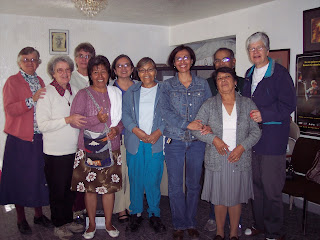 Six grass roots representatives from five different Juárez neighborhoods:
Six grass roots representatives from five different Juárez neighborhoods:
Speaking on behalf of their neighborhood, these grass roots representatives shared the most recent violence experienced there. In addition, each shared one or more positive steps their neighborhood has taken to reduce this violence.

Two friends at a Juárez peace and justice center:
Our friends at the Justice and Peace Center offered their analysis of the violence in Juárez and the armed actors involved in that violence. Also, we were invited to walk their labyrinth and enjoy the peaceful space they have created in the midst of downtown Juarez.
An internationally recognized activist:
This renowned activist from Juárez shared her work regarding las muertas de Juárez the dead women of Juárez. She got involved in the work in 2001 because one of her seventeen year old students was found murdered and mutilated. Since then she has been working tirelessly to support the families of the slain women and girls, and she has been investigating the murders. For her good work she has received hundreds of death threats and must always be accompanied by bodyguards.
By way of background, since 1993, the bodies hundreds women and girls have been found in the desert outside Juárez, or in vacant lots and drainage ditches. All were raped and many mutilated. At the time of their violent deaths the victims were between 12-22 years in age.
Recommended Reading: Diana Washington Valdez, an investigative reporter for the El Paso Times, has covered the murders for three years. Her book Harvest of Women is recommended. Also recommended is a book entitled, The Daughters of Juarez by Teresa Rodriguez.
A human rights attorney:
Our team also interacted with an attorney who specializes in constitutional law, human rights law, and policing limitations. He is alarmed because there are violations of human rights. Also, he asserts that the Mexican constitution has been violated because the Mexican army has been given a policing role. Moreover, he maintains that legitimate police agencies in Juárez have been ineffective in their work due to a lack of coordination and organization.
 November 4, 5, and 6 Reports and Headlines from a Juarez Newspaper called El Diaro:
November 4, 5, and 6 Reports and Headlines from a Juarez Newspaper called El Diaro:
On November 4 another the human rights attorney began his sharing with us by reporting that there were six homicides by 8:00 am on November 4th. Then he sadly predicted that there would be 13 to 15 homicides by day’s end… On November 5th the newspaper reported that 15 homicides [in Juárez] occurred on November 4, 2009.
The November 5th lead story was about the murder of four young men. At noon these men were lined up along a school fence and shot dead. Students were in the playground when this happened.
In the November 6th headlines of the El Diario Newspaper we read: “Half of the people from Juárez favor paramilitary groups-Citizens should be able to bear arms.”
 Six grass roots representatives from five different Juárez neighborhoods:
Six grass roots representatives from five different Juárez neighborhoods:Speaking on behalf of their neighborhood, these grass roots representatives shared the most recent violence experienced there. In addition, each shared one or more positive steps their neighborhood has taken to reduce this violence.

Two friends at a Juárez peace and justice center:
Our friends at the Justice and Peace Center offered their analysis of the violence in Juárez and the armed actors involved in that violence. Also, we were invited to walk their labyrinth and enjoy the peaceful space they have created in the midst of downtown Juarez.
An internationally recognized activist:
This renowned activist from Juárez shared her work regarding las muertas de Juárez the dead women of Juárez. She got involved in the work in 2001 because one of her seventeen year old students was found murdered and mutilated. Since then she has been working tirelessly to support the families of the slain women and girls, and she has been investigating the murders. For her good work she has received hundreds of death threats and must always be accompanied by bodyguards.
By way of background, since 1993, the bodies hundreds women and girls have been found in the desert outside Juárez, or in vacant lots and drainage ditches. All were raped and many mutilated. At the time of their violent deaths the victims were between 12-22 years in age.
Recommended Reading: Diana Washington Valdez, an investigative reporter for the El Paso Times, has covered the murders for three years. Her book Harvest of Women is recommended. Also recommended is a book entitled, The Daughters of Juarez by Teresa Rodriguez.
A human rights attorney:
Our team also interacted with an attorney who specializes in constitutional law, human rights law, and policing limitations. He is alarmed because there are violations of human rights. Also, he asserts that the Mexican constitution has been violated because the Mexican army has been given a policing role. Moreover, he maintains that legitimate police agencies in Juárez have been ineffective in their work due to a lack of coordination and organization.
 November 4, 5, and 6 Reports and Headlines from a Juarez Newspaper called El Diaro:
November 4, 5, and 6 Reports and Headlines from a Juarez Newspaper called El Diaro:On November 4 another the human rights attorney began his sharing with us by reporting that there were six homicides by 8:00 am on November 4th. Then he sadly predicted that there would be 13 to 15 homicides by day’s end… On November 5th the newspaper reported that 15 homicides [in Juárez] occurred on November 4, 2009.
The November 5th lead story was about the murder of four young men. At noon these men were lined up along a school fence and shot dead. Students were in the playground when this happened.
In the November 6th headlines of the El Diario Newspaper we read: “Half of the people from Juárez favor paramilitary groups-Citizens should be able to bear arms.”
Thursday, November 5, 2009
November 4, 2009
On Wednesday, November 4, 2009, we met with a human rights attorney. He made a thorough presentation of the deaths in Juárez based on newspaper accounts for the last year or so. His overall report included a summary of various news articles that accentuated the ineffectiveness of the Mexican army presence in curbing or reducing the homicides in Juárez.
He also brought to our attention the complexity of the violence in Juárez with vivid examples, many reported in credible newspapers, of kidnappings, disappearances, extortion, death threats, how children are becoming immune to the day to day killings, the flight of businesses and entire families to either El Paso or other places in the interior of México, and the random murder of people who denounce any type of violence.
Additionally, the Juárez situation gets more complex when, according to the attorney, other types of violence are taken into account. Violence such as prostitution, closing of maquiladoras (assembly factories) lack of jobs, AIDS, trafficking in children, government corruption, and the violence to people migrating to the USA and to those being deported back to México and Central America.
He also brought to our attention the complexity of the violence in Juárez with vivid examples, many reported in credible newspapers, of kidnappings, disappearances, extortion, death threats, how children are becoming immune to the day to day killings, the flight of businesses and entire families to either El Paso or other places in the interior of México, and the random murder of people who denounce any type of violence.
Additionally, the Juárez situation gets more complex when, according to the attorney, other types of violence are taken into account. Violence such as prostitution, closing of maquiladoras (assembly factories) lack of jobs, AIDS, trafficking in children, government corruption, and the violence to people migrating to the USA and to those being deported back to México and Central America.
Wednesday, November 4, 2009
November 3, 2009

Tuesday we visited the Human Rights center that invited the MPT to come to Juárez. There were 12 dedicated people who began their work in 2001.They have developed clear vision and mission statements throughout the years.They have analyzed the situation and planned educational workshops, formed different committees, and are working to deepen their commitment to the community.We also saw two presentations,one regarding the internal functioning of the group and the other showed reported statistics about the increase of homicides since the military arrived in Juárez. Also.they provide legal and psychological help to individuals and for groups that have been deeply affected by the violence.

In the evening, our team met with a neighborhood reflection group consisting of elderly women. These women shared personal experiences with violence, i.e., kidnapping, home invasion by the military, and homicides. Hearing their stories, the team was deeply moved.
Monday, November 2, 2009
November 2, 2009

We toured Juárez, a city of 1.5 million people. Our tour included several industrial centers of maquiladoras from the USA and a few other countries. What was striking on the tour were the number of companies that have left Juárez, initially going to China for lower wages, and more recently the closure of other factories due to the economic crisis. The results: unemployment for thousands of people, deteriorating buildings, and abandobment of the city,
We also toured many neighborhoods, commercial areas, and land along the border. We viewed one area in the mountains where the people are being driven from their homes by a rich family who aim to develop the area for profit. The poor have no political or judicial recourse due to the collusion of the government with the rich families. Interesting to note was the reduced number of military presence on the streets.
Today was the memorial and celebration of the Day of the Dead, which has indigenous roots. We united at the border fence line on the Mexican side with the people of El Paso, Texas a nd Las Cruces, New Mexico to remember together all those who died crossing the Rio Grande into the United States. It was said that 5000 people have died in recent times, seeking a better life for their families or escaping from violence in their own countries. The photos show the release of balloons symbolizing persons who have lost their lives in both sides the border.
nd Las Cruces, New Mexico to remember together all those who died crossing the Rio Grande into the United States. It was said that 5000 people have died in recent times, seeking a better life for their families or escaping from violence in their own countries. The photos show the release of balloons symbolizing persons who have lost their lives in both sides the border.

In this same spirit we visited one of municipal cemeteries where we found graves beautifully cared for and adorned with bright colored flowers as well as neglected and some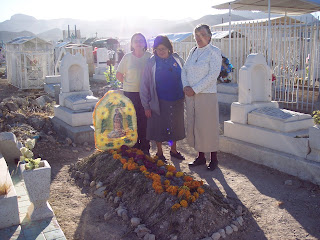 vandalized graves.
vandalized graves.
The municipal government has the obligation maintain the cemeteries, roads, hospitals, schools but has failed in these responsibilities due to the great economic drain incurred to pay the military forces deployed in the city. It was clear to us today that security over rides all other human needs.
Berta, Jose, Renee, and Liz
We also toured many neighborhoods, commercial areas, and land along the border. We viewed one area in the mountains where the people are being driven from their homes by a rich family who aim to develop the area for profit. The poor have no political or judicial recourse due to the collusion of the government with the rich families. Interesting to note was the reduced number of military presence on the streets.

Today was the memorial and celebration of the Day of the Dead, which has indigenous roots. We united at the border fence line on the Mexican side with the people of El Paso, Texas a

In this same spirit we visited one of municipal cemeteries where we found graves beautifully cared for and adorned with bright colored flowers as well as neglected and some
 vandalized graves.
vandalized graves.The municipal government has the obligation maintain the cemeteries, roads, hospitals, schools but has failed in these responsibilities due to the great economic drain incurred to pay the military forces deployed in the city. It was clear to us today that security over rides all other human needs.
Berta, Jose, Renee, and Liz
Sunday, November 1, 2009
November 1, 2009
Michigan Peace Team's Exploratory Team to Juarez arrived safe and sound. Julie and Antonia waited two and a half hours to cross the bridge into El Paso, then they drove on to the El Paso airport. We had a delicious dinner together at a Mexican restaurant in El Paso. After dinner we drove to the house we are renting in a Juárez neighborhood. Our host team reviewed the tentative schedule for the duration of our stay.
Today we learned that there were over 300 murders in Juárez during October 2009. We believe it is important that we are here!
Your exploratory Team in Juárez
Berta, Jose, Liz and Renee
Today we learned that there were over 300 murders in Juárez during October 2009. We believe it is important that we are here!
Your exploratory Team in Juárez
Berta, Jose, Liz and Renee
Subscribe to:
Posts (Atom)



